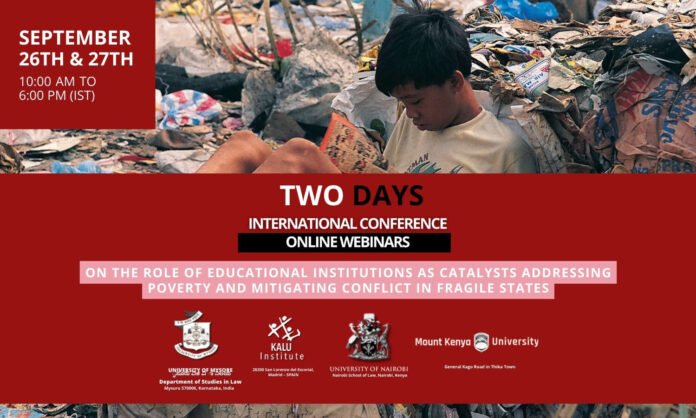[ad_1]
Department of Studies in Law, University of Mysore (India) is organising a Two-Day International Conference on The Role of Educational Institutions as Catalysts in Addressing Poverty and Mitigating Conflict in Fragile States, in collaboration with Kalu Institute (Madrid, Spain), School of Law, University of Nairobi (Kenya), and Mount Kenya University (Kenya).
About the Institution
The Department of Studies in Law, University of Mysore, was established in 1973 and is a prominent institution in Southern India, recognized for its high standards in legal education and research. The department offers a two-year LL.M. program with specializations in Constitutional Law, International Law, and Business and Trade Law. The program is research-oriented, requiring students to complete a dissertation, many of which are published. The department also offers a Ph.D. program, supporting advanced research under the guidance of experienced faculty. It attracts a diverse student body from across India and internationally, including countries such as Afghanistan, Iran, Kenya, Tanzania, and Yemen.
About the Conference
The conference is scheduled to be held on 26–27 September 2025, and is jointly organized by the University of Mysore (India), Kalu Institute (Spain), University of Nairobi (Kenya), and Mount Kenya University (Kenya). This interdisciplinary event aims to bring together scholars, practitioners, and policymakers from the fields of law, education, and public policy.
Themes
- Transformative Education as a Catalyst for Economic Empowerment
- Equity, Access, and Inclusion in Fragile Education Systems
- Innovative Financing Mechanisms for Education in Fragile and Conflict-Affected Contexts
- Technical and Vocational Education and Training (TVET) for Sustainable Livelihoods and Self-Reliance
- Education and the Sustainable Development Goals in Fragile States
- Integrating Peace Education and Social Cohesion into School Curricula
- Post-Conflict Reconstruction of Educational Infrastructure and Systems
- The Role of Higher Education in Governance Reform and Policy Development
- Community-Based and Informal Education for Conflict Prevention
- Digital Learning Technologies and Educational Continuity in Crisis Contexts
Eligibility
This conference is intended for individuals with academic or professional expertise in the fields of Law, Economics, Political Science, Sociology, and related disciplines. We particularly welcome the participation of postgraduate students, early-career researchers, faculty members, practitioners, and professionals affiliated with non-governmental organizations (NGOs) operating in fragile and conflict-affected regions.
Applications to serve as a conference speaker must be submitted by 15 September 2025 via email to [email protected], using the subject line: “Speaker at Role of Educational Institutions as Catalysts Addressing Poverty and Mitigating Conflict in Fragile States”.
Eligibility and Requirements for Speakers
- A PhD in Law, Economics, Political Science, Sociology, or a closely related discipline.
- Currently affiliated as a faculty member with a recognized academic institution, or
- An active social practitioner or activist affiliated with an internationally recognized NGO working in poverty alleviation, hunger relief, or conflict resolution.
- Submission of a Europass-format CV.
- Confirmation of willingness to participate virtually.
- A 600-word abstract of the proposed presentation, accompanied by a PowerPoint presentation (PPT).
- Selection Criteria: Originality, thematic relevance, clarity of presentation, and overall contribution to the objectives of the conference.
Eligibility and Requirements for Participants
- Submission of a Curriculum Vitae in Europass format.
- Confirmation of online participation for the full two-day conference.
- Agreement to complete a post-conference assessment, with certification based on examination performance.
- Submission of a 300-word Statement of Purpose (SOP) reflecting personal views on poverty and conflict globally. The SOP must be an original piece of work, without the use of AI tools or content generation software.
Formatting Guidelines
- Abstract: Maximum of 150 words, including the paper title and five keywords.
- Full Manuscript: 4,500–5,000 words.
- Citation Style: OSCOLA, 4th Edition.
- Font: Times New Roman, 12 pt
- Line Spacing: 1.5
- Footnotes: Times New Roman, 10 pt, single spacing
- File Format: Microsoft Word (.doc or .docx) only.
- Co-Authorship: Maximum of two authors per paper.
- Referencing: All sources must be properly acknowledged.
- Plagiarism Policy: Similarity index must not exceed 10% (Turnitin); AI-generated text is strictly prohibited.
- Submission Deadline: 20 September 2025
- Selected papers will be published in an Open Access Edited Volume (Spain, Europe).
Programme Details
- Mode: Online (Virtual)
- Dates: Friday, 26 September 2025 – Saturday, 27 September 2025
- Daily Timings: 10:00 AM to 6:00 PM (Indian Standard Time – IST)
- Post-Conference Examination: Tuesday, 30 September 2025
Registration
- Registration Fee: None (Free of charge)
- Application Deadline: 15 September 2025
- Notification of Acceptance: 20 September 2025
- Registration Link: [Click here to Register]
Downloads
Brochure: [Click here to view]
Contact
Mr. Sayed Qudrat Hashimy (PhD) – Regional Coordinator for Asia, Africa, and America
Email: [email protected].
[ad_2]
Source link

